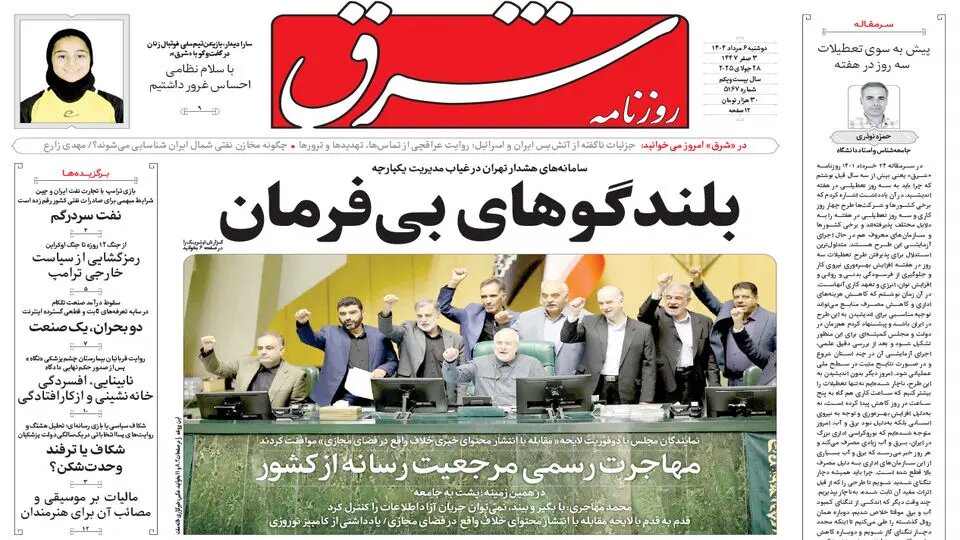Saudi Arabia's meaningful decision

TEHRAN - In its analysis, Shargh explored Saudi Arabia’s refusal to supply THAAD missile interceptors to Israel, following a U.S. request during the Iran-Israel war in June.
The United States, a traditional ally of Israel and Saudi Arabia, had asked Riyadh to provide Israel with part of its THAAD stockpile amid escalating Iranian missile attacks. Saudi Arabia, however, declined the request. This refusal marks a calculated shift in Riyadh’s foreign policy—one that favors strategic restraint over direct military involvement. Having recently restored diplomatic ties with Iran, Saudi Arabia seems committed to maintaining regional balance rather than fueling confrontation. From this standpoint, withholding military aid to Israel appears to be a deliberate effort to preserve neutrality and cool tensions. Saudi Arabia increasingly seeks to portray itself as a stabilizing and mediating force in the region. With Defense Minister Khalid bin Salman’s visit to Tehran and ongoing trust-building efforts, Riyadh is positioning itself not as a party to conflict but as a potential crisis manager and peace broker.
Ham Mihan: We must continue to follow the right path
In an analysis, Ham Mihan dealt with possible activation of the snapback mechanism by the European trio (Britain, France and Germany) which will return UN sanctions against Iran that had been lifted with the conclusion of the JCPOA in 2015. It wrote: Snapback is the hot topic these days. It is especially favorable for the domestic hardliners these days because they are busy saying why diplomacy is not good and that other paths should be taken. They do not shun diplomacy, but rather believe that if the same previous, costly path had continued, Iran would have been in a better position now. We wish there were no snapback mechanism. But before that, we should think that if correct policies had been adopted there would have been no Security Council resolutions that forced Iran to pull itself out of this pit. Without (UN Security Council) resolutions, there would have been no snapback. Even today, diplomacy is underway despite all problems and obstacles. The key to answering the question why Iran is pursuing the path of dialogue with the European side right now, or why the narrow window of dialogue with the United States has not been closed lies in this point. The country cannot be left in conditions like those of the 2000s and early 2010s, under pressure from the Security Council. We must continue to follow the right path.
Arman-e-Melli: Iran must be prudent
Mostafa Hashemitaba, a former vice president and presidential candidate, told Arman-e-Melli that Iran must be vigilant about the plots of the Zionist regime and the United States. He said: There is a possibility of another military attack on Iran by the United States and Israel, which could affect the country's future. The point is that the risk of activation of snapback mechanism is less than the risk of war. The important point in this regard is whether Iran is going to fight Israel or the United States in the future. If the war with Israel is going to continue, we can think in short term. But if a war between Iran and the United States occurs, negotiation and diplomacy will not be effective. This is the playing field that has been designed for us, and we should not enter this game because we do not know what its fate will be. Iran must be vigilant and refrain from entering a predetermined game. For this reason, Iran should not act emotionally and passionately in these circumstances and should approach the issue with more tact.
Etemad: China’s mediation may reconcile views in Iran to resume talks with US
Etemad discussed the ambiguities surrounding possible resumption of talks between Tehran and Washington in an interview with Rahman Ghahramanpour, a foreign policy analyst. He said: Regarding resumption of talks between Tehran and Washington, the main issue seems to be the atmosphere of distrust that prevailed after the Israeli and U.S. aggressions against Iran. The U.S. attack on the Fordow nuclear plant has led to the formation of two different views on the talks in Iran’s political atmosphere. One group believes that the talks were a deception from the beginning, while another group, which supports diplomacy, has concluded that it should confront the U.S. by resorting to more stringent levers. Some believe that the pause in the start of the Iran-U.S. talks may be due to Iran’s consultation with China on how to start the talks. If it is so, it can be said that the two views inside the country will probably come closer together and will somehow agree to Beijing's mediation. They believe that China is capable of ending the current deadlock in the talks.
Leave a Comment